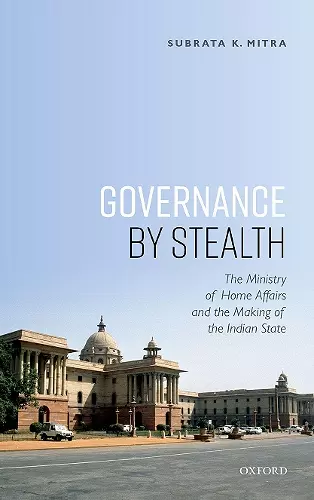Governance by Stealth
The Ministry of Home Affairs and the Making of the Indian State
Format:Hardback
Publisher:OUP India
Published:19th Nov '21
Should be back in stock very soon

India's Ministry of Home Affairs, with its striking durability, and ability to adapt to the transition from colonial rule to post-colonial governance, is a remarkable example of institutional resilience. Home's special expertise in governance by stealth - maximum order with the use of minimum force - was instrumental for the department to acquire a secure niche within the colonial structure. Following the end of colonial rule in 1947, the Home Department, still ensconced in the majestic North Block of Delhi, mutated into the Home Ministry of the Indian Republic. How a colonial institution whose key task was to hold Indian nationalism at bay became the architect of the post-colonial state and nation, is one of the main questions to which I respond in this book. Home's multiple roles as the keeper of public order, mentor to public services and the invisible sinews of the state that holds the noisy democracy and assertive regions together to explain its exalted status in India's governance and politics. My analysis, based on declassified files of the Ministry of Home Affairs, correspondences, biographies and interviews, explores the multiple roles of the Ministry, with its penchant for governance by stealth as my focus
Subrata Mitra has provided us with a new, profound, and deep understanding of the remarkable degree to which India is and has become a mostly stable, civil and orderly society. He has probed as never done before the history and the politics of the Home Ministry, the most important part of India's government beyond - maybe even including - the office of Prime Minister. Governance by Stealth explains India's resilient democracy as a consequence of its institutional arrangements, most especially its Home Ministry's stealthy ability to sustain order without force. No one can hope to understand India's development or democracy's development without studying this gift that Professor Mitra has given us - a deep dive into the real workings of a civil, orderly India. Truly a great book! -Bruce Bueno de Mesquita, Julius Silver Professor of Politics, NYU, New York
A pioneering interdisciplinary voyage from history to politics to society, Mitra's book breaks new ground. As the first rigorous exploration of North Block and its role in governance, it is must-reading for anyone trying to make sense of Indian democracy itself, its extant fragilities and, at the same time, its enduring resilience. The study is predicated on a deep insight of Indian politics and the competition among the political elite. The book provides an incisive analysis of the development from Raj to Swaraj, on to deeper political upheavals of the Seventies and the resurgence of democracy. It is a magnum opus, for every Indian seeking to learn of how India evolved. -Shri Vinod Rai, former Comptroller and Auditor General of India
From splitting Kashmir to enacting a controversial citizenship law, from laying down weekly protocols for the world's most sweeping pandemic lockdown to toughening laws on internal security, no other Ministry wields as much power or straddles as many fault-lines as the Union Home Ministry. More so, under the strongest single-party government in almost four decades with the Opposition ranks denuded like never before. Subrata Mitra's magisterial work couldn't have come at a more critical time. - Raj Kamal Jha, Chief Editor, the Indian Express
Few democracies have managed to sustain electoral responsiveness within a framework of order when facing challenges as deep as those of India. Subrata Mitra's remarkable new book digs beneath the surface into official archives and personal accounts to analyze the efforts of the Indian Ministry of Home Affairs to manage "maximum order with minimum force" over more than half a century-often, but not always, successfully. What he reveals about politics and policymaking is relevant to every democracy, especially in today's challenging times. - Professor G. Bingham Powell, University of Rochester, NY
ISBN: 9780199460489
Dimensions: 222mm x 150mm x 31mm
Weight: 606g
472 pages